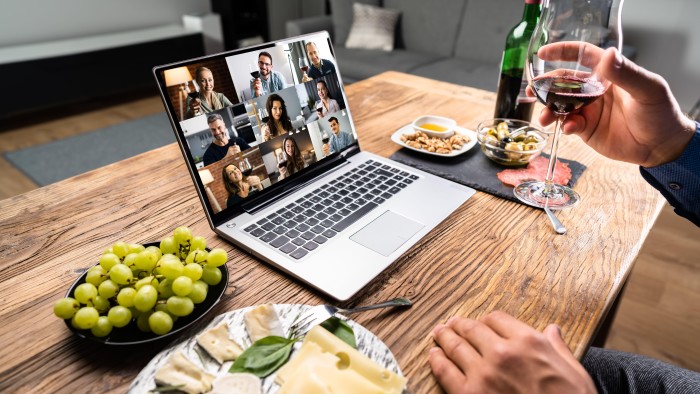Law firms turn to pay and perks to keep their people happy

Roula Khalaf, Editor of the FT, selects her favourite stories in this weekly newsletter.
Soaring inflation and the growing threat of a global economic recession have so far failed to chill the competition for skills among the world’s biggest law firms.
The result? Partners are being pressed to offer pay rises, grant permission to work from home, and more actively mentor people in an attempt to keep them from leaving.
So far this year, law firm Baker McKenzie has increased pay for qualified lawyers to £110,000, while Herbert Smith Freehills has increased certain salaries by 14 per cent to £120,000.
Clifford Chance and Freshfields Bruckhaus Deringer, meanwhile, both raised pay for certain lawyers to £125,000 in recent months.
In its financial results, Keystone Law Group in September said “the biggest ‘war for talent’ seen in over a decade” had made it harder to bring on new lawyers.
“Law firms continue to struggle to land top talent,” agrees Jamy Sullivan, executive director for global talent solutions at business consulting firm Robert Half. Sullivan, who specialises in the legal sector, says the unemployment rate is less than 2 per cent in the wider industry and only 1 per cent for lawyers, specifically.
“It’s still a candidate-driven market,” she adds. Law firms need to be ready to offer competitive pay plus perks: “Be prepared to negotiate and move quickly to make an offer.”
But, while many big law firms are having to pay more, they are also looking at other ways to encourage staff and keep them happy at work.
Young lawyers, in particular, want a sensible work-life balance — and are more willing, in its absence, to walk away from their jobs. About 20 per cent of lawyers aged 40 and under said they were thinking about leaving the profession entirely, according to a report in January from the London-based International Bar Association.
Half of European respondents said they felt overworked. And about one-third said they did not have mentors, career guidance or promotion opportunities.
Presented with survey findings such as these, law firms know they need to make improvements. While some companies have offered perks — even Peloton exercise bikes — to motivate workers, law firms have increasingly invested in programmes to keep lawyers satisfied at work and to ward off burnout.
London-based Bird & Bird has developed a global professional skills curriculum to keep lawyers engaged. These online courses, launched in September 2021, are one way Bird & Bird has tried to broaden its personal development initiatives, it says. Offerings at its network of local offices may vary, but Bird & Bird says it hopes this programme will help cut down the numbers of people thinking about leaving.
UK-based Addleshaw Goddard has also launched a development programme in the fight to retain skilled staff. “Coaching programmes are nothing new, but the thing that stands out for me is people from within the business that are coaches,” says Sophie Manson, head of learning. At other law firms, she adds, it is generally human resources people or external consultants that undertake the coaching.
Addleshaw Goddard’s programme includes a six-month suite of personal effectiveness sessions all underpinned by coaching support. And it is aligned to the darker and colder months of the year when more people are typically hit by low moods, she explains.
“This isn’t human resources-led”, she says. “One of the partners said you can genuinely feel the change in the culture across the firm.
“If you look around [at another] firm, they can offer you another salary but are they offering a programme like this?” Manson argues. “It could help make people think twice about whether they want to leave Addleshaw Goddard and whether they enjoy the culture of the firm.”

More law firms are recognising their struggle to hire, retain and promote more women and minorities. To address this, Norton Rose Fulbright launched a career strategies programme for women in 2010. It was then reworked in 2019 to address racial and ethnic diversity.
The programme has helped to increase the proportion of women partners from 16 per cent to 21 per cent since 2010. And, since 2011, women have represented 43 per cent of partner promotions, the firm says.
More recently, law firms have been extending the ability for staff to work remotely. Covid-19 forced most professionals to work from home for a time, and the arrangement is proving hard to unwind.
Now, most firms have embraced hybrid working, having accepted that a working week of five long days in the office will not return soon, if at all. They tend to request that staff spend at least three days a week in the office.
The balance between working at home and in the office has become increasingly important for lawyers in deciding where to work.
Last year, Robert Half reported that one-third of professionals working from home said they would look for a new job if their business forced them to be in the office full-time.
“Giving staff autonomy over when and where they work is the future of work,” Sullivan concludes. “Legal hiring managers and organisations must evolve to attract and retain the best legal talent.”
Case studies in best practice: People management; Multi-disciplinary teams; and Diversity and inclusion
Researched, compiled and ranked by RSGI. ‘Winner’ indicates the organisation won an FT Innovative Lawyers 2022 award.
People management
Winner: PwC Tax & Legal — Spain
Originality: 7 Leadership: 8 Impact: 8 — Total 23
The legal arm of the professional services firm has revamped how it manages recruitment, training and development. In order to find more hires with digital skills, it has partnered with universities to identify appropriate students taking degrees other than law. The division has also rolled out mandatory training on project management and digital skills to approximately 1,000 people.
Lastly, it has changed how it allocates staff to work: people are now allocated to projects based on their capabilities rather than geographic location.
Standout
Herbert Smith Freehills
O: 8 L: 8 I: 6 — Total 22
The firm has embarked on an extensive listening exercise to understand how staff feel about its corporate culture, their own work experience and how things could change for the better. More than two-thirds of employees have participated globally. There are also focus groups involving more than 300 staff representing every role and career stage at the firm.
BonelliErede
O: 7 L: 7 I: 7 — Total 21
The firm has made several improvements to how it manages its people. These include introducing a bonus system that rewards whole teams if they hit specific targets, and making promotion requirements more transparent. The time to make partner has also been reduced by two years.
Commended
Abreu Advogados
O: 6 L: 7 I: 7 — Total 20
The firm is providing wellbeing consultations with nutritionists, opticians and psychologists.
TLT
O: 6 L: 7 I: 7 — Total 20
The firm has pledged a two-year, multimillion pound investment to support its transition to flexible working. Changes include the redesigning of physical spaces and digital tools, and encouraging staff to experiment with styles of working.
Ecija
O: 6 L: 6 I: 6 — Total 18
The firm has implemented a hybrid working policy that includes being able to work four weeks a year from anywhere, no fixed office hours, and two Fridays a year to focus on wellbeing. The firm is implementing ideas from staff-listening exercises.
Freshfields Bruckhaus Deringer
O: 6 L: 6 I: 6 — Total 18
The firm’s 200-strong mental health affinity group has introduced initiatives to improve working practices, including a “walk and talk” scheme that allows staff to conduct telephone calls away from desks.
Multi-disciplinary teams
Winner: Ashurst
Originality: 7 Leadership: 9 Impact: 9 — Total 25
The lawyers helped bankers at Santander UK and the London branch of Banco Santander in their move to use alternatives to Libor as a benchmark interest rate, ahead of a regulatory deadline.
The assembled team comprised experts from various practice areas, including financial documentation data cleansing specialists. A digital platform was set up to support the process.

Standout
Linklaters
O: 8 L: 8 I: 6 — Total 22
The firm created a global mobility sector group in response to the changing nature of the global automotive industry. The sector practice is organised around six areas: electric and other alternative-fuel vehicles; charging infrastructure; investment in gigafactories and batteries; development of mobility services, software and tech; mass transit and logistics; and satellites and communication.
Commended
Macfarlanes
O: 7 L: 7 I: 7 — Total 21
The firm established a team comprising financial services, tax and reward partners and the head of corporate advisory to assist clients with the introduction of the UK’s Investment Firms Prudential Regime.
Shoosmiths
O: 6 L: 7 I: 7 — Total 20
The firm launched a “one-stop” service for non-legal compliance work that provides regulatory and business consulting to financial services clients.
Addleshaw Goddard
O: 6 L: 7 I: 6 — Total 19
The firm established a team to bring together a group of experts on housing. It advises housebuilders, developers, landowners, housing associations, investors and mixed-use developments.
Burgess Mee Family Law
O: 6 L: 7 I: 6 — Total 19
The Happy Co-parent website, created and managed by the firm, combines advice from lawyers, therapists, mediators and coaches.
Deloitte Legal
O: 5 L: 7 I: 6 — Total 18
The firm has brought together a legal managed services team comprising legal professionals with varied backgrounds. It uses data management to create an improved system to help the Bank of Spain to handle complaints.
Diversity and inclusion
Winner: DWF
Originality: 7 Leadership: 8 Impact: 8 — Total 23
The digital innovation and ventures team developed a model that uses the firm’s anonymous historic diversity data to estimate the demographics of those who do not voluntarily disclose such information, in order to improve its statistics’ accuracy. The work helped the firm encourage improved participation. As a result, disclosure has risen by 5 percentage points over the past year.

Standout
Linklaters
O: 8 L: 7 I: 7 — Total 22
The firm ran a four-month training scheme to help refugees and asylum seekers in the UK into legal careers. The course aimed to help with language and technical skills and develop commercial awareness. Two participants have been offered training contracts with the firm.
Pinsent Masons
O: 7 L: 8 I: 7 — Total 22
The firm created a global group to co-ordinate diversity and inclusion efforts across all its offices. The new structure ensures that initiatives focusing on topics such as social mobility and recognising neurodiversity are rolled out globally. The firm’s neurodiversity network, for example, provides management training and an improved framework for staff and potential recruits affected by neurodiverse conditions.
Paul Hastings
O: 6 L: 8 I: 7 — Total 21
The firm helped London-based Generation Success, which aims to provide career opportunities for disadvantaged young people, to trial its new digital mentoring platform to improve community engagement. The firm is also providing mentorship to students interested in business services roles, such as marketing.
Freshfields Bruckhaus Deringer
O: 6 L: 7 I: 7 — Total 20
The firm created “virtual internships”, open to anyone, to offer insights into the experience of working on legal matters at the firm. Some 11,000 people have completed the Law in Fintech course, which is designed to give a sense of a junior lawyers’ work advising a fictitious client, and is adapted from real Freshfields work.
Commended
Fieldfisher
O: 6 L: 7 I: 6 — Total 19
The disability network at the firm is advising a leading UK university on inclusive language for a course in disability law. It has also launched partnerships to improve opportunities for aspiring disabled lawyers.
Mills & Reeve
O: 6 L: 7 I: 6 — Total 19
The firm’s disability network ran a project to ensure disabled employees are allocated work fairly and are able to access career opportunities. Following a campaign to raise awareness of the issue, more staff have felt able to disclose their disabilities to human resource managers.
Norton Rose Fulbright
O: 6 L: 7 I: 6 — Total 19
In 2019 and 2021, the firm ran a programme to help black, Asian and minority ethnic staff overcome barriers to promotion. Six of the first cohort of 10 people have since been promoted.
Simmons & Simmons
O: 5 L: 7 I: 6 — Total 18
The firm has launched a formal policy to help those affected by the menopause, allowing for adjustments such as changes in work allocation or more frequent breaks.

Comments